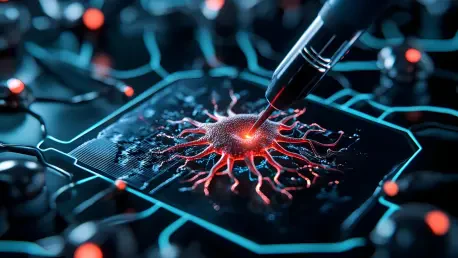Recent strides in biotechnology promise to transform the landscape of health diagnostics with the development of a cutting-edge biosensor. Created at the Birla Institute of Technology and Science (BITS) Pilani, Hyderabad, this innovative device offers a needle-free, quick, and remarkably inexpensive alternative to traditional blood testing. By allowing for the detection of essential health markers in sweat, blood, urine, and even cell cultures, the biosensor has emerged as a significant advancement in non-invasive monitoring tools. Particularly beneficial in managing chronic conditions like diabetic cardiomyopathy, this innovation highlights how technology can drive accessibility and efficiency in healthcare monitoring.
Innovative Biosensor Technology Unpacked
The core of this biosensor’s ingenuity lies in its ability to perform real-time metabolic monitoring by detecting glucose and lactate levels in various biological fluids. Using an electrochemical sensing platform developed through inkjet printing on a flexible polyimide surface, the biosensor operates as a substrate that facilitates necessary physical and chemical reactions for metabolite detection. This advanced approach ensures high sensitivity and specificity, bypassing the need for complex laboratory setups traditionally required for such diagnostic tests. With specialized enzymes placed on carbon nanotubes, the biosensor can convert biochemical signals into electrical impulses, enabling precise and immediate health readings.
Another groundbreaking aspect of this technology concerns its cost-effectiveness. At Rs 15, it represents a drastic reduction compared to conventional diagnostic methods, democratizing access to health monitoring tools. This affordability mirrors a broader trend within healthcare innovations aimed at minimizing costs while maximizing reach. Notably, by eliminating the need for dyes, antibodies, or imaging equipment often associated with other platforms, this biosensor not only cuts expenses but also simplifies the diagnostic process, facilitating widespread application both in clinical settings and personal healthcare.
Potential Impact on Healthcare Delivery
The biosensor’s ability to deliver real-time data is transformative, offering swift insights that traditional laboratory tests might delay. Its high precision in low-oxygen environments signifies an improvement over earlier sensor technologies and showcases its versatility across various conditions and scenarios. For medical professionals and researchers alike, this means that immediate metabolic changes can be monitored effectively, enabling timely interventions and informed decision-making, particularly in critical care or constant monitoring situations.
Furthermore, designed with a plug-and-play approach, the biosensor negates the necessity for specialized equipment handling or extensive user training. This ease of use widens its applicability, allowing routine laboratory environments to seamlessly integrate it into existing systems. Beyond healthcare facilities, this device holds potential for personalized medicine, drug screening, and toxicity testing—areas where rapid, reliable data can dramatically influence outcomes. Its adaptability could inspire future technological convergence within wearable devices, fostering continuous health tracking in non-clinical spaces.
Broader Implications for Biotechnology
This biosensor aligns with a growing consensus on the role of biotechnology in advancing personalized and accessible healthcare solutions. The device minimizes dependency on conventional blood tests performed by highly trained personnel, which not only streamlines processes but also expands access. Particularly in resource-constrained regions, such affordability and accuracy in diagnosis can lead to significant enhancements in individual healthcare experiences. Coupled with its potential compatibility with wearable technology, these advancements suggest the dawn of a new era in healthcare monitoring, wherein everyday life can readily incorporate health tracking without impediments.
Thus, the culmination of these technological features speaks to their comprehensive impact on healthcare delivery. The BITS biosensor integrates minimally invasive techniques with quick and cost-effective monitoring capacities, a testament to patient-centered care. Its utility spans disease management and laboratory research, enhancing the accuracy of cell-based experiments and improving predictive insights therein. Through continued innovations, similar devices are projected to populate diverse settings—from homes to hospitals, enabling robust health solutions tailored to specific needs.
Key Takeaways and Future Directions
Exciting developments in biotechnology are set to revolutionize health diagnostics with a cutting-edge biosensor crafted at the Birla Institute of Technology and Science (BITS) Pilani, Hyderabad. This groundbreaking device provides a needle-free, rapid, and cost-effective alternative to conventional blood tests. Its capability to discern vital health markers in sweat, blood, urine, and even cell cultures marks a significant leap forward in non-invasive monitoring tools. This biosensor is especially advantageous for those managing chronic diseases like diabetic cardiomyopathy, illustrating how technological advancements can greatly enhance accessibility and efficiency in healthcare. By offering a painless and simplified method of monitoring crucial health indicators, it underscores the transformative potential of biotechnology. Such innovations are pivotal in reshaping the future of medical diagnostics, making them more patient-friendly and inclusive. Technology here is not just a tool, but a gateway to improved health monitoring and management for everyone.









